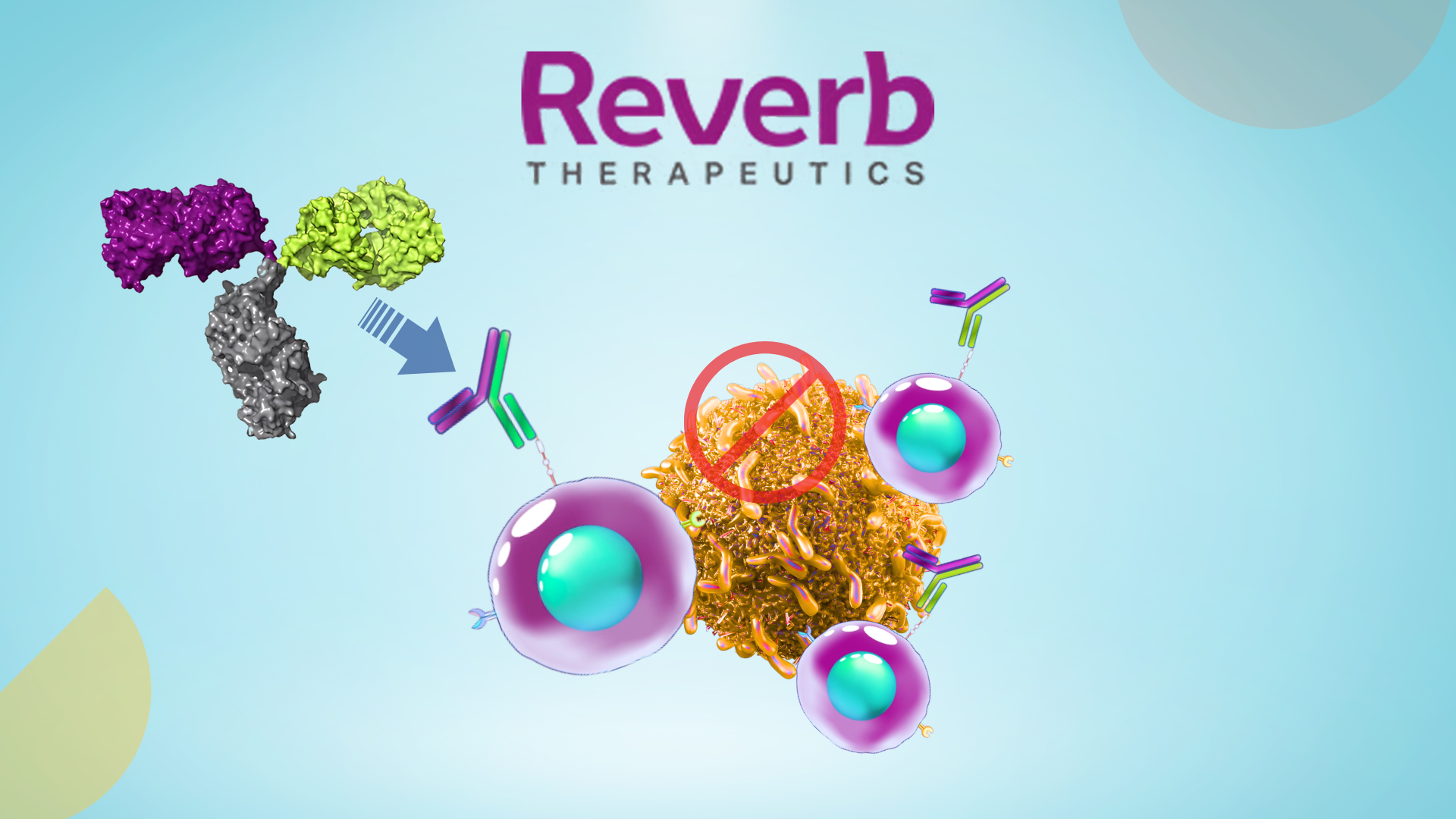Not all cancer cells are created equal, and that’s a big reason why ICIs like Keytruda fail long-term. For over 80% of patients, the cancer finds a way back. Why? Cancer cells evolve, hide, and manipulate the immune system. Some cells respond to treatment; others don’t. This selective resistance renders a revolutionary therapy a temporary solution.
A startup named Reverb Therapeutics has developed a novel approach in oncology to address these issues. They focus on amplifying the body’s natural immune response. Instead of introducing new foreign substances, they enhance the immune system’s existing mechanisms, allowing immune cells to identify and target cancer cells more effectively. Their lead drug, AMP01, amplifies the effects of PD-1 inhibition (the mechanism behind Keytruda), providing a potentially more powerful and sustainable solution to cancer treatment.
To better understand how their invention works, we spoke to David De Graaf, CEO of Reverb Therapeutics. This article contains notable highlights from our entire conversation.
This interview is part of our exclusive Scouted By GreyB series. Here, we speak with the founders of innovative startups to understand how their solutions address critical industry challenges and help ensure compliance with industry and government regulations. (Know more about startups scouted by GreyB!)
“In patients with cancer, very often the immune system is just under that ability to go and control tumor growth. We’re helping it to amplify that effect now.”
– David De Graaf

David de Graaf is the Co-founder, President, and CEO of Reverb Therapeutics, a Vancouver-based biotech startup pioneering a novel approach to cytokine therapy. De Graaf is a seasoned biopharma entrepreneur with a strong track record of leading innovative biotech ventures. Before Reverb, he served as CEO at Abcuro, Comet Therapeutics, and Syntimmune. He’s also held leadership roles at Apple Tree Partners, Flagship Pioneering, Pfizer, AstraZeneca, and Boehringer Ingelheim.
How Reverb Therapeutics Targets Cancer Using the Body’s Own Defenses
Reverb Therapeutics is a Vancouver-based biotech company focused on revolutionizing cancer treatment by leveraging the body’s immune system. Their approach involves amplifying the immune system’s natural responses, particularly through the use of cytokines like IL-15, to enhance the efficacy of existing cancer immunotherapies.

What is Reverb Therapeutics working on in oncology?
David: At Reverb, we’re working on a new class of cancer treatments that aim to boost the power of the immune system. Specifically, we’re enhancing the body’s natural immune defenses, particularly its ability to detect and fight cancer. We’re focusing on cytokines like IL-15, which naturally signal immune cells to attack, and we’re combining that with existing therapies like PD-1 inhibitors to create a more potent anti-cancer response. This combination could potentially offer better, more lasting results compared to current therapies, especially in patients whose cancers have become resistant to other treatments.
What makes cytokines like IL-15 appealing for cancer therapies?
David: Cytokines are critical signaling molecules that the immune system uses to coordinate its response to threats. IL-15 is particularly powerful because it helps activate two types of immune cells: natural killer cells and cytotoxic T cells. These cells are fantastic at targeting and destroying cancer cells. By enhancing this natural system, we can boost the body’s ability to fight cancer, without needing to introduce foreign drugs. This is a more natural and, we believe, safer approach, as it taps directly into the body’s defenses.
Why has no one else done this before?
David: The concept of combining cytokines with PD-1 inhibition isn’t entirely new, but the challenge has been how to do it without causing harmful side effects. Cytokines, when administered systemically, can trigger inflammation and toxicity throughout the body. Traditional approaches have attempted to combine cytokines with antibodies; however, this method has its limitations.
What we’re doing differently is capturing the natural cytokines already present in the body. Instead of introducing large amounts of cytokines, we’re amplifying the body’s existing immune signals, which can provide a much more controlled and localized immune activation. This method, using a bispecific antibody platform, is both more effective and safer.
What challenges have you faced in the development of this therapy?
David: One of the biggest challenges has been navigating preclinical testing, where results from mice don’t always translate to humans. Mice are genetically identical, so it’s easy to see consistent results. Humans, on the other hand, are much more diverse, and our immune systems don’t always respond the same way.
However, in preclinical studies, we’ve seen some promising signs, particularly when our treatment has been combined with PD-1 inhibitors. We are optimistic about the clinical potential, although we recognize that clinical trials will be the ultimate test. Additionally, there are the usual challenges of securing funding, as biotech is a harsh industry right now, especially for early-stage companies.
How does your platform fit into the current cancer treatment landscape?
David: Our platform is unique because it doesn’t rely on introducing completely foreign agents into the body. Unlike other immunotherapies that create new immune targets, we are amplifying the body’s natural immune responses. This makes our approach not only innovative but also potentially more sustainable and scalable.
By combining our bispecific antibody platform with well-established cancer immunotherapies, such as PD-1 inhibitors, we believe we can create a more potent and effective treatment option that can be integrated into current treatment regimens. Our ultimate goal is to provide long-term remission and improved quality of life for patients battling cancer.
What are your expansion plans?
David: Right now, we are focused on advancing our lead program, AMP01, into clinical trials. We’re in the process of securing additional funding and partners to help us get to the next stage. In the long term, we aim to expand our platform’s capabilities to include a variety of cancers, not just those currently treated with PD-1 inhibitors.
We’re also working on exploring other immune system amplifiers that could complement our existing technology, potentially treating autoimmune diseases and other conditions that could benefit from modulating immune activity.
What regulatory hurdles do you anticipate?
David: The regulatory process is always a big challenge in biotech. We are working closely with regulatory agencies to ensure that our treatments meet safety and efficacy standards. Thankfully, there’s a growing recognition of the potential of immune system modulation, so we are hopeful that we can work through the process efficiently. However, it’s still a long road, and we know we’ll have to prove both the safety and effectiveness of our treatments in human trials before we can bring them to market.
Meet our Interviewer – Shabaz Khan, Marketing Manager at GreyB
Shabaz Khan, Marketing Manager
Want to find other scalable startups innovating in cancer treatment and prevention? Please fill out the form below to contact our experts.
Get in touch
Please share your query below



